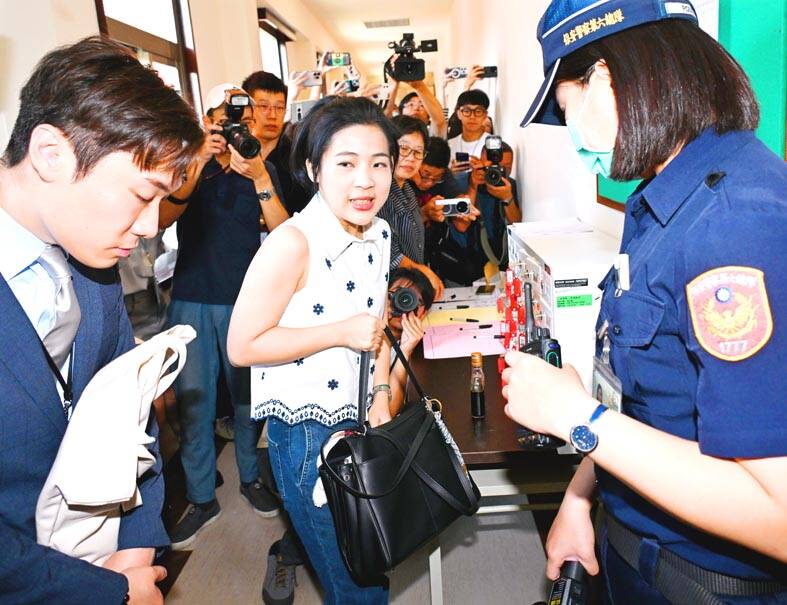Premier Cho Jung-tai (卓榮泰) yesterday directed all ministries and agencies to support industries affected by US tariffs, pending the implementation of a special budget, adding that companies affected by the levies could now apply for the relief program.
The measure is part of the government’s strategy of providing immediate assistance followed by long-term planning, he added.
On July 11, the Legislative Yuan passed the third reading of the government’s Special Act for Strengthening Economic, Social and National Security Resilience in Response to International Circumstances (因應國際情勢強化經濟社會及國土安全韌性特別條例) in response to the US tariffs. The act has a ceiling of NT$545 billion (US$18.28 billion), which includes a NT$10,000 cash payment to each citizen, NT$150 billion for whole-of-society defense resilience, NT$93 billion for industry and employment support, and NT$67 billion for social support.

Photo: Fang Pin-chao, Taipei Times
The government is still in discussions with the US on issues such as tariffs and supply chain cooperation, Cho said.
Executive Yuan spokesperson Michelle Lee (李慧芝) said that the special budget was not part of yesterday’s meeting.
Some adjustments need to be made to the industrial support plan, she said, adding that the rest of the special act would remain unchanged.
The Executive Yuan would ask the Constitutional Court to review the cash handout provision, Lee said on Thursday last week.
Yesterday, she said that the Executive Yuan would continue to communicate and work through legal channels.
The government does not have an unlimited budget, Democratic Progressive Party caucus chief executive Rosalia Wu (吳思瑤) said.
There are still questions that remain unanswered, such as whether wealthy families would be excluded from the cash payment, and whether the special act is constitutional, Wu said.
Meanwhile, the Chinese Nationalist Party (KMT) yesterday panned a closed-door meeting of the Legislative Yuan’s Foreign Affairs and National Defense Committee to review classified documents on Taiwan-US tariff negotiations, calling it an effort to keep the public in the dark.
KMT Legislator Hsu Chiao-hsin (徐巧芯) and others said they only signed in, but did not attend the meeting, which ended in an hour.
The meeting was open to all legislators, but the KMT and the Taiwan People’s Party said they would not attend, as they had to provide government oversight.
Deputy Minister of Foreign Affairs Chen Ming-chi (陳明祺) said that the meeting was nearly unprecedented, but the ministry and the Executive Yuan’s Office of Trade Negotiations were willing to acquiesce and respect legislative oversight.
The closed-door meeting satisfied the need to keep the contents of the negotiations confidential, while allowing legislators to review documents that are relevant to their fields of interest, Chen said.
Additional reporting by Chen Cheng-yu and Fang Wei-li

Taipei, New Taipei City, Keelung and Taoyuan would issue a decision at 8pm on whether to cancel work and school tomorrow due to forecasted heavy rain, Keelung Mayor Hsieh Kuo-liang (謝國樑) said today. Hsieh told reporters that absent some pressing reason, the four northern cities would announce the decision jointly at 8pm. Keelung is expected to receive between 300mm and 490mm of rain in the period from 2pm today through 2pm tomorrow, Central Weather Administration data showed. Keelung City Government regulations stipulate that school and work can be canceled if rain totals in mountainous or low-elevation areas are forecast to exceed 350mm in

TRAFFIC SAFETY RULES: A positive result in a drug test would result in a two-year license suspension for the driver and vehicle, and a fine of up to NT$180,000 The Ministry of Transportation and Communications is to authorize police to conduct roadside saliva tests by the end of the year to deter people from driving while under the influence of narcotics, it said yesterday. The ministry last month unveiled a draft of amended regulations governing traffic safety rules and penalties, which included provisions empowering police to conduct mandatory saliva tests on drivers. While currently rules authorize police to use oral fluid testing kits for signs of drug use, they do not establish penalties for noncompliance or operating procedures for officers to follow, the ministry said. The proposed changes to the regulations require

EVA Airways president Sun Chia-ming (孫嘉明) and other senior executives yesterday bowed in apology over the death of a flight attendant, saying the company has begun improving its health-reporting, review and work coordination mechanisms. “We promise to handle this matter with the utmost responsibility to ensure safer and healthier working conditions for all EVA Air employees,” Sun said. The flight attendant, a woman surnamed Sun (孫), died on Friday last week of undisclosed causes shortly after returning from a work assignment in Milan, Italy, the airline said. Chinese-language media reported that the woman fell ill working on a Taipei-to-Milan flight on Sept. 22

1.4nm WAFERS: While TSMC is gearing up to expand its overseas production, it would also continue to invest in Taiwan, company chairman and CEO C.C. Wei said Taiwan Semiconductor Manufacturing Co (TSMC) has applied for permission to construct a new plant in the Central Taiwan Science Park (中部科學園區), which it would use for the production of new high-speed wafers, the National Science and Technology Council said yesterday. The council, which supervises three major science parks in Taiwan, confirmed that the Central Taiwan Science Park Bureau had received an application on Friday from TSMC, the world’s largest contract chipmaker, to commence work on the new A14 fab. A14 technology, a 1.4 nanometer (nm) process, is designed to drive artificial intelligence transformation by enabling faster computing and greater power